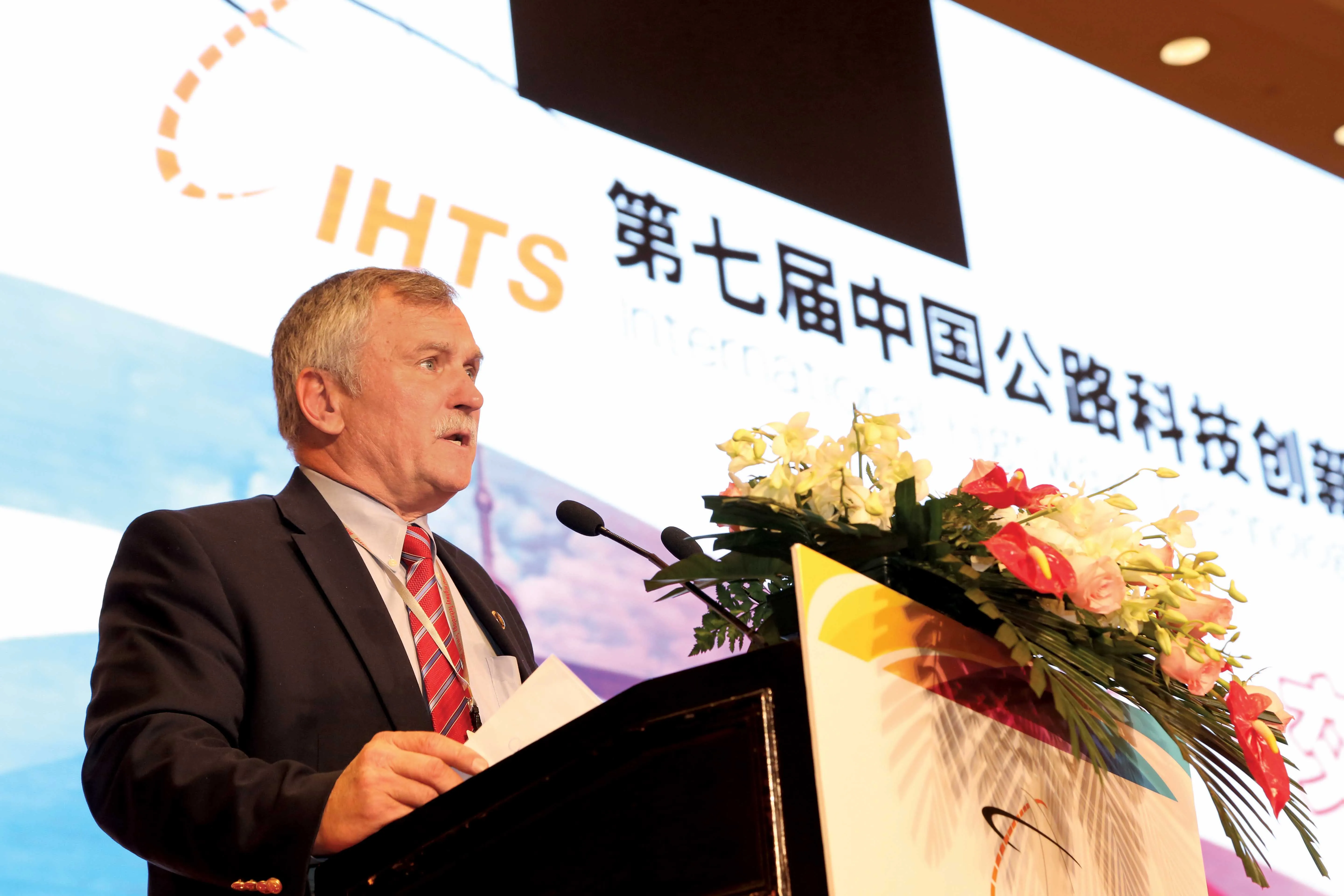Those who navigate the labyrinth that is the European Union and the numerous trade and research groups will be struck by the number of acronyms. In a short series, EUROFILE gives a snapshot of those engaged in the roads industry. In this issue we look at FEHRL (Forum of European National Highway Research Laboratories) based in Brussels, Belgium Established in 1989, FEHRL is made up directors of national research institutes: 30 in all from within the European Union, European Free Trade Association (EFTA) an
July 31, 2012
Read time: 4 mins

Those who navigate the labyrinth that is the 1116 European Union and the numerous trade and research groups will be struck by the number of acronyms. In a short series, EUROFILE gives a snapshot of those engaged in the roads industry. In this issue we look at 5160 FEHRL (Forum of European National Highway Research Laboratories) based in Brussels, Belgium
Established in 1989, FEHRL is made up directors of national research institutes: 30 in all from within the European Union, European Free Trade Association (EFTA) and other countries. Its primary task is to promote an efficient and safe road network in Europe, as well as increasing innovation in European road construction and road-using industries. FEHRL has close cooperation with CEDR (Conference of European Directors of Roads) and is the main point of communication outside the Commission, says Steve Phillips, secretary general of FEHRL.
A key function for FEHRL is to provide scientific input to EU and national government policy on highway engineering and road transport matters. That includes a number of R&D projects, some through partnering with the2465 European Commission within the 6th and 7th Framework Programme of research. The European Commission is allocating over E4 billion to road transport research in the current EU Framework Research Programme (FP7).
The most notable has been ARCHES (Assessment and Rehabilitation of Central European Highway Structures). Its goal is to develop ways to raise the standard of highway structures of new member states (NMS) and central and eastern European countries (CEEC).
Another is CALM II (Coordination of European Research for Advanced Transport Noise Mitigation), which supports the EC in setting up the agenda for future transport noise R&D.
INQUEST (Information Network on QUiet European road Surface Technology) will coordinate communication and dissemination of past and present research on the use of low-noise technologies for road surfaces to European countries with less access and experience in applying knowledge in that field. One of the main instruments will be the dissemination of the contents of the Guidance Manual developed by SILVIA by means of a series of workshops.
SILENCE (Quieter Surface Transport) aims to develop holistic methodologies and technologies for improved control of surface transport noise in urban areas. Issues to be covered include noise control at the source, noise propagation, noise emission, and the human perception of noise.
SPENS (Sustainable Pavements for European New member States) is to develop appropriate tools and procedures for the rapid and cost-effective rehabilitation and maintenance of roads in the EU New Member States (NMS).
More recently there has been CERTAIN (Central European Research in Transport), designed again to facilitate integration of the EU new member states (NMS) and other central and eastern European countries (CEEC) into the established R&D community.
The acompanying NRC2 (New Road Construction Concepts) develops long-term perspectives and physical trial projects and demonstrations in the field of road construction, in which long-term visions and ideas are linked to short-term actions.
Steve Phillips says there are currently 15 projects under way as part of an EU Surface initiative, not including other activities. "All these programmes are important, of course, but NRC2 is really important in raising the profile of innovation in the road sector. CERTAIN is important in promoting the involvement of new member states. It reinforces the importance of road infrastructure to those countries." New projects lined up include DirectMat, which looks at recyclable materials, ReRoad (renewable roads) and Tyrosafe (skid resistance, noise and rolling resistance).
"We are also looking at coordinating more with other countries, like the US and its SHRP programme. In Slovenia we recently organised the second of a series of workshops on non-destructive testing of pavements and bridge embankments and tunnels and pavements. We are looking to bounce around a few more subjects"
Phillips believes some of the biggest challenges facing the industry include climate change and how the whole of Europe prepares for this. "The link with other modes of transport (rail and water) is important. There is enormous encouragement to move to other modes, yet in many respects they are more vulnerable to extreme events than roads. I was in Belgrade at the time of the Danube flooding; nothing was being moved by water." Other issues were road congestion and the adoption of ITS, he added.
Established in 1989, FEHRL is made up directors of national research institutes: 30 in all from within the European Union, European Free Trade Association (EFTA) and other countries. Its primary task is to promote an efficient and safe road network in Europe, as well as increasing innovation in European road construction and road-using industries. FEHRL has close cooperation with CEDR (Conference of European Directors of Roads) and is the main point of communication outside the Commission, says Steve Phillips, secretary general of FEHRL.
A key function for FEHRL is to provide scientific input to EU and national government policy on highway engineering and road transport matters. That includes a number of R&D projects, some through partnering with the
The most notable has been ARCHES (Assessment and Rehabilitation of Central European Highway Structures). Its goal is to develop ways to raise the standard of highway structures of new member states (NMS) and central and eastern European countries (CEEC).
Another is CALM II (Coordination of European Research for Advanced Transport Noise Mitigation), which supports the EC in setting up the agenda for future transport noise R&D.
INQUEST (Information Network on QUiet European road Surface Technology) will coordinate communication and dissemination of past and present research on the use of low-noise technologies for road surfaces to European countries with less access and experience in applying knowledge in that field. One of the main instruments will be the dissemination of the contents of the Guidance Manual developed by SILVIA by means of a series of workshops.
SILENCE (Quieter Surface Transport) aims to develop holistic methodologies and technologies for improved control of surface transport noise in urban areas. Issues to be covered include noise control at the source, noise propagation, noise emission, and the human perception of noise.
SPENS (Sustainable Pavements for European New member States) is to develop appropriate tools and procedures for the rapid and cost-effective rehabilitation and maintenance of roads in the EU New Member States (NMS).
More recently there has been CERTAIN (Central European Research in Transport), designed again to facilitate integration of the EU new member states (NMS) and other central and eastern European countries (CEEC) into the established R&D community.
The acompanying NRC2 (New Road Construction Concepts) develops long-term perspectives and physical trial projects and demonstrations in the field of road construction, in which long-term visions and ideas are linked to short-term actions.
Steve Phillips says there are currently 15 projects under way as part of an EU Surface initiative, not including other activities. "All these programmes are important, of course, but NRC2 is really important in raising the profile of innovation in the road sector. CERTAIN is important in promoting the involvement of new member states. It reinforces the importance of road infrastructure to those countries." New projects lined up include DirectMat, which looks at recyclable materials, ReRoad (renewable roads) and Tyrosafe (skid resistance, noise and rolling resistance).
"We are also looking at coordinating more with other countries, like the US and its SHRP programme. In Slovenia we recently organised the second of a series of workshops on non-destructive testing of pavements and bridge embankments and tunnels and pavements. We are looking to bounce around a few more subjects"
Phillips believes some of the biggest challenges facing the industry include climate change and how the whole of Europe prepares for this. "The link with other modes of transport (rail and water) is important. There is enormous encouragement to move to other modes, yet in many respects they are more vulnerable to extreme events than roads. I was in Belgrade at the time of the Danube flooding; nothing was being moved by water." Other issues were road congestion and the adoption of ITS, he added.








